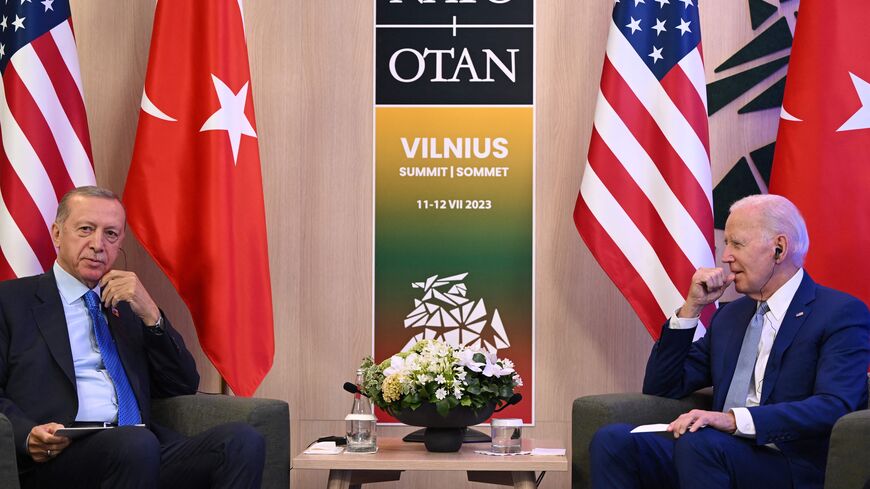Turkish President Recep Tayyip Erdogan is postponing his May 9 visit to the White House, multiple outlets reported on Friday, a move that will likely upend efforts to mend ties after prolonged friction and that will play into the hands of Russia’s President Vladimir Putin.
A spokesperson from the US Embassy in Ankara said, “We look forward to hosting President Erdogan at the White House at a mutually convenient time, but we have not been able align our schedules.”
Sources familiar with the details of the planned summit told Al-Monitor the decision likely stemmed from the White House’s decision to take so long, as Ankara saw things, to formally announce the visit. Comments from National Security Council Coordinator for Strategic Communications John Kirby on Thursday are thought to have been the tipping point. Asked about the visit, Kirby said, “There’s nothing on the schedule to speak to in terms of a specific visit by President Erdogan. So, I don’t really have a comment on that.”
Officials on both sides have been preparing for the meeting, which was long sought by Erdogan, and speaking on background said the trip was on up until today.
US President Joe Biden is the first in two decades not to receive Erdogan in the White House in his first three years in office.
Turkey’s acquisition of Russian-made S-400 missile batteries and its military operations against the US-led anti-ISIS coalition’s Syrian Kurdish allies poisoned ties. However the conflicts in Ukraine and Gaza and escalating tensions with Iran have put Turkey’s strategic heft back into the limelight. Erdogan has sought to leverage this to the maximum, holding out on approving Sweden’s NATO membership for long months.
The Biden administration’s decision earlier this year to greenlight the sale of F-16 fighter jets and modernization kits for Turkey’s existing fleet led to a thaw and an invitation to the White House. News of the visit was leaked by Ankara two days ahead of nationwide municipal elections on March 31.
Oda TV, a Turkish news outlet, reported on April 20 that Erdogan would be canceling the visit after the United States approved a $26 billion aid package for Israel.
The change in tone was palpable as Erdogan lambasted Israel and the Biden administration over its Gaza policy during a conference on Jerusalem held in Istanbul today. He called Israeli Prime Minister Benjamin Netanyahu “the butcher of Gaza” and asserted that “we won’t be among those who falsely accuse Hamas of being a terrorist organization.” Erdogan continued, “With the unconditional military and diplomatic support that it lends to Israel, the American administration is not contributing to a solution, rather it is making the problem bigger.” Erdogan also took aim at the United States’ veto at last week’s United Nations Security Council in response to Palestine’s request for full membership of the international body.
Erdogan, a passionate advocate of Palestinian rights, has thrown his support behind the Palestinians in the Gaza war but has been criticized by his base for not doing enough. They made their displeasure known at the ballot box during the March 31 local elections, defecting in considerable numbers to a smaller Islamist party, the New Welfare Party, which campaigned on a militantly pro-Gaza platform. The party more than doubled its ratings in the elections, snatching several key municipalities from Erdogan’s Justice and Development Party.
Ankara has since been steadily harshening its stance, slapping restrictions on the export of 54 items to Israel. It has not, however, curbed the flow of oil to Israel from Azerbaijan via a pipeline that runs to the southern Mediterranean port of Ceyhan. Around 60% of Israel’s oil imports are thought to come from Azerbaijan and Kazakhstan. And while Turkey withdrew its ambassador from Tel Aviv soon after Hamas ignited the conflict when it slaughtered some 1,200 Israelis on Oct. 7, there has been no hint of freezing diplomatic ties.
Indeed, sources familiar with the planning of Erdogan’s program suggested that the real issue was the lack of clarity from Washington that allowed hawks around Erdogan pressing him to scotch the trip to prevail. Oda TV is known for its anti-American and pro-Russian stance.
Namik Tan, a former Turkish ambassador to Washington and Israel and a member of parliament for the pro-secular main opposition Republican People’s Party, said it would not be surprising if Erdogan had been insisting on being accorded a reception at a level that the Biden administration was not willing to provide and that the Turkish leader decided to opportunistically postpone the visit and “reclaim his mantle as the savior of Palestine” among his base and on the Arab street.
“It is clear that the White House mismanaged things very badly and did not read Erdogan’s mood accurately. This is a huge win for Russia,” Tan told Al-Monitor.
Gonul Tol, director of the Middle East Institute’s Turkey program, concurred. “Erdogan will use this to shore up his image domestically and stanch further defections to New Welfare,” she told Al-Monitor.
A Western diplomat speaking to Al-Monitor on background said, "If the purpose is to grandstand for Gaza, what better opportunity to blast the administration's Israel policy than standing before the cameras alongside Biden in Washington?"
The likely damage inflicted to US-Turkish relations will become clearer once the sides pronounce themselves officially on the matter. Does the postponement mean that Erdogan will not take part in the July’s NATO summit in Washington? That too remains unclear.
But for now, “Putin is likely rubbing his hands in glee,” Tan noted. As for what concrete difference the cancellation will make to the people in Gaza that is even less clear, Tan added.
Ezgi Akin contributed to this report from Ankara.
This developing story has been updated since its initial publication.



